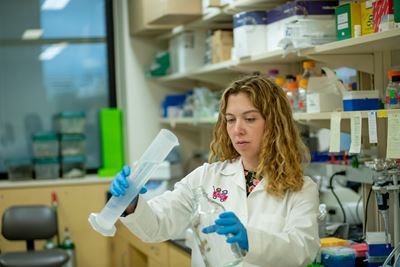World Diabetes Day, observed every year on November 14th, is dedicated to spreading awareness about a chronic health condition that affects more than 415 million people worldwide. This year, the significance of World Diabetes Day is especially profound for the Swigert family from Franklin, Indiana. In March 2023, their lives forever changed when 10-year-old Emmaline was diagnosed with type 1 diabetes.
“When we found out she had type 1 diabetes, there was a little crying between my husband, her and me in the hospital,” said Emmaline’s mother, Robin Swigert. “But she took everything in stride. She has been a rockstar through the whole thing.”
Today, Emmaline is participating in an Indiana University School of Medicine-led clinical trial aimed at testing a pill that could help make life much easier for individuals like her living with the condition.
Type 1 diabetes is an autoimmune disease where the body’s immune system mistakenly attacks and destroys the insulin-producing beta cells in the pancreas. This results in lifelong dependence on insulin therapy, daily blood sugar monitoring and other serious lifestyle changes.
Last winter, Robin noticed her daughter was experiencing extreme thirst, frequent urination and unexplained weight loss. Because her grandfather had type 1 diabetes, Robin recognized these symptoms of the disease and connected with Emmaline’s doctor to conduct bloodwork. Subsequently, Emmaline was referred to Riley Children's Health, where further tests confirmed her diagnosis.
“The day I decided to call the doctor, we had just gone to a movie. She went to the bathroom before we left the house, when we got to the theater, in the middle of the movie, after the movie, and when we got home,” Robin said. “She hadn't had anything to drink in that time period, so that was the biggest red flag that we needed to get her checked out.”

The pediatric diabetes and endocrinology team at Riley Children’s Health provided the Swigert family with diabetes education resources, helped get Emmaline on a treatment plan and familiarized her with a Dexcom continuous glucose monitor so she could check her blood sugar levels without finger pricks. During this transitional period, Robin was also approached about having Emmaline enroll in a clinical trial for children and adults newly diagnosed with type 1 diabetes, and the family agreed.
“One of the perks is the trial pays for her Dexcom for the year,” Robin said. “That was a huge financial burden taken off our shoulders as we’re learning all about her prescriptions, insulin and just trying to pay for everything. It’s been a huge help.”
The clinical trial known as "Tadpol," short for "TArgeting type 1 Diabetes via POLyamines," builds upon years of dedicated research led by IU School of Medicine physicians and scientists. The trial’s objective is to determine the efficacy of the drug α-difluoromethylornithine (DFMO) as a treatment option to preserve insulin production in humans with type 1 diabetes. DFMO already has FDA approval as a high-dose injection treatment for African Sleeping Sickness and is also being studied for neuroblastoma maintenance therapy post-remission, but it has never been considered for treating diabetes. However, promising results from the research group’s earlier studies, recently published in Cell Reports Medicine, provide compelling evidence that a new pill formulation of DFMO may hold a key to preserving the body's insulin production in people with type 1 diabetes.
Six study sites across the country have joined the clinical trial where participants are enrolled for approximately 12 months and are expected to take daily DFMO or controlled placebo pills. Additionally, participants partake in a series of six in-person visits, during which they receive comprehensive examinations and monitoring conducted by experienced specialists, including the trial's leader, Emily K. Sims, MD, an associate professor of pediatrics at IU School of Medicine and a pediatric endocrinologist at Riley Children's Health.
Sims said the current standard of care for people with type 1 diabetes, subcutaneous insulin replacement therapy, has seen miraculous advances over time, but insulin replacement is not a cure for the disease.
"Therapies targeting the underlying pathology of the disease process may ultimately reduce the need for insulin replacement,” said Sims, who is also a physician-scientist at the Herman B Wells Center for Pediatric Research and the Center for Diabetes and Metabolic Diseases at IU School of Medicine. “We believe that combination regimens of these disease-modifying therapies, like DFMO, hold the potential to usher in a new era of type 1 diabetes treatment and meaningful change for those affected by the condition.”

Despite being in the very early stages of her lifelong journey with diabetes, Emmaline is already about halfway through her participation in the clinical trial. As for the pills she's consuming as part of the study, their effects are yet to fully manifest, and it’s unknown whether she is receiving the DFMO or a placebo because the trial is a double-blind study, but the Swigert family is hopeful for a positive road ahead.
“In terms of being diagnosed, she’s still in the honeymoon phase,” Robin said. “Her pancreas is still producing insulin here and there, so that’s the whole point of the [DFMO] drug. It’s trying to extend the honeymoon period and get the pancreas to continue working longer.”
Sims expects the Tadpol clinical trial and its analysis to continue for about 4 years, at which point the researchers should have a thorough understanding of whether treatment with DFMO stabilizes the body’s own insulin production in a person with type 1 diabetes.
"These types of studies are a huge effort, and the real heroes are participants like Emmaline and their families, who are critical to keeping these important efforts moving forward so that one day we can really move the needle on the way that this disease impacts the quality of life for affected patients,” said Sims.
The Tadpol clinical trial is co-led by Sims and Linda DiMeglio, MD, MPH, Edwin Letzter Professor of Pediatrics, with funding provided by the Juvenile Diabetes Research Foundation (JDRF) and drug supported by Panbela Therapeutics. Individuals interested in enrolling or learning more about the trial can visit the study’s website.
